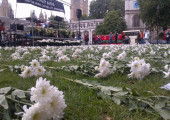
By John Pring Disability News Service 9th November 2017
A new handbook on direct action, a national day of action on inclusive education, and a call for healthcare professionals to boycott disability benefit assessments were among campaign ideas suggested by disabled activists at a national conference.
The National Disabled People’s Summit saw up to 200 Deaf and disabled activists discussing ways to coordinate the fight against austerity and “reinvigorate” the disabled people’s movement.
Sean McGovern, co-chair of the TUC’s disabled workers’ committee, who chaired the event, said disabled people had not “passively” accepted the attack on their rights and services over the last nine years.
He told the conference that the aim of the event was to bring together Deaf and disabled people from the trade union movement, Deaf and disabled people’s organisations, and grassroots campaigns to “find ways to better pool our knowledge and experiences” and organise joint campaigning.
He said: “We are trying to get together to build our resources together… and hopefully stop fighting battles separately.”
A key part of the event saw disabled people take part in workshops aimed at producing ideas for future campaigning across areas such as accessible transport, inclusive education, independent living and social security.
Other workshops discussed how to develop those campaigns, for example through direct action and protests, trade union organising, and using the law and media.
The conference, at the headquarters of the National Education Union in central London, was funded by unions, and co-organised by the Reclaiming Our Futures Alliance.
Among the ideas suggested were the need for a national strategy and set of principles describing the aims of the disabled people’s movement, and for a new handbook for direct action protests, which would take leads from the activists’ handbook developed by the Disabled People’s Direct Action Network (DAN) and the activist toolkit used by the US disabled people’s grassroots group ADAPT.
The conference heard that there was a need to “spread protest and direct action everywhere”.
Other workshops suggested the need for a national education service that is “inclusive from the top to the bottom”, and called for a national day of action that highlights both the “good things that are happening” in inclusive education and the “threats” it is facing.
On independent living, fears were raised about the reinstitutionalisation of disabled people, particularly concerns about the number of people with learning difficulties being forced into long-stay private hospitals.
There were also calls for a legal right to independent living through a free national independent living service, paid for from general taxation, and for “real choice and control, where disabled people are in control and not professionals or social workers”.
On accessible transport, ideas for campaigns included a focus on the importance of disabled passengers being able to “turn up and go”, which the summit heard was “gradually being phased out” by train companies.
On mental health, there was a call for recognition that all people “contribute to society even if not contributing to profit”, for an emphasis on the “social causes of mental distress”, and for unions “to be able to represent people both working and not working and recognise us all as members of the working class”.
Among the campaign ideas on social security was a challenge to nurses and doctors who are members of the Royal College of Nursing and the British Medical Association, and who carry out disability benefit assessments, to “down tools and not take part” in such testing for ethical reasons.
There were also objections to Labour’s “pause and fix” policy position on universal credit, with activists demanding instead that the line on the government’s new working-age benefits system should be to “stop and scrap” it.
On disability hate crime, there were calls for more to be done to challenge and report such offences and to pursue them with the authorities “because we need charges, convictions and sentencing in order to make people confident to go down this path”.
There was also a call to “find allies in the police, Crown Prosecution Service and local authorities and elsewhere and work with them”, and to develop allies and alliances across different equality strands and build on their past successes, for example in combatting race hate crime.
Other workshops produced calls for international solidarity with disabled migrants and refugees and disabled people facing starvation in other countries; and the need for better training for union representatives, so they can provide improved support for disabled employees.
There was a recognition that cuts to jobs and services mean people are “having to work harder and faster in much more difficult conditions”; a call for regular disability arts protests; and for attention to be paid to the barriers faced by disabled people who are “intersectional”, such as black disabled women, or gay disabled men.
And there was a call for a new hub where disabled people and their organisations could share information and resources, for example on benefit assessments and appeals, as a way of taking action to “increase our knowledge of our rights, but equally importantly how we use that knowledge in our lives”, such as in day-to-day communication with social workers or service-providers or in “big strategic legal action cases”.
Ideas that came out of the workshops will now be collated and worked into a report to be published in the next few months.
